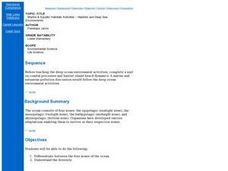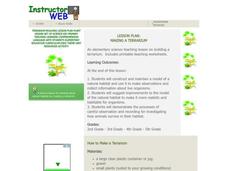Curated OER
What's in That Cake?
Learners explore the depths of the Gulf of Mexico. In this deep-sea habitat lesson, students construct edible models of deep-sea habitats as they bake cakes that include representations of the habitats and the organisms that live there....
Curated OER
Entering the Twilight Zone
Students describe major features of cold seep communities and list organisms that are found in these communities. For this water habitat lesson students examine trophic levels, describe the process of chemosynthesis and list...
Curated OER
A Bioluminescent Gallery
Students examine the different types of luminescence in deep sea organisms. In this bioluminescence lesson, students investigate how color and light aide deep ocean organisms by describing the characteristics of the habitat and...
Curated OER
Astronauts Train in Deep-Space Brine
Students examine an article on astronauts training in deep space brine then discuss what they learned. In this investigative lesson students get into groups and design an exercise that includes isolation, silence and conflict...
Curated OER
Habitats and Deep Sea Environments
Students examine and identify the characteristics of the four zones of the ocean. They discover the amount of diversity in marine habitats. They also explore the adaptations organisms have that have allowed them to survive.
California Academy of Science
Discovering Rainforest Locations
How many rainforests are there, where are they, and do global factors effect their locations? These are great questions that have great answers. Children in grades four through eight use several different maps to determine why...
Curated OER
Entering The Twilight Zone
For this lesson sixth grade students get into groups and research a given ocean habitat. The major features of cold-seep communities are the objective but plenty information is given about other habitats which could be assigned to...
Curated OER
Invent an Insect
Explore biology by researching adaptation. First, learners research and define a list of insect vocabulary terms and discuss the benefits of each insect characteristic. They then utilize a worksheet to create their own insect and share...
Curated OER
Mapping Deep-Sea Habitat
Students create a two-dimensional topographic map and a 3-D model of landforms. In this creative lesson students create 2 and 3-D objects and learn how to interpret the data from these things.
Curated OER
Feeding in the Flow
The National Oceanic and Atmospheric Administration (NOAA) has developed a tremendous library of ocean-themed lessons that can be used in a variety of science settings. "Feeding in the Flow" is one of those activities; Its focus is on...
Curated OER
Entering the Twilight Zone
Students describe major features of cold-seep communities and the process of chemosynthesis as it relates to organisms in each habitat. In this deep-sea habitats lesson, students study the categorization of ocean habitats...
Curated OER
Life on the Hardbottom
Students find similarities and differences between a biotrope habitat and an ecosystem. In this hardbottom biotrope instructional activity, students research and respond to inquiry questions about a biotrope. Students...
Curated OER
Journey To the Unkown
Learners explore the ocean rift habitat off the Galapagos through an audio expedition, Internet research on deep sea animals, an explorer game and simulation of the exploration of the deep sea bottom. They focus on the actual NOAA...
Curated OER
Freshwater Habitats
Middle schoolers take samples from local freshwater sources and examine them for macroinvertebrate life. They take samples from both shallow and deep freshwater environments, measure temperatures, and classify organisms found in their...
Curated OER
Making a Terrarium
Students construct and maintain model of natural habitat, suggest improvements to the model of the natural habitat to make it more realistic and habitable, and demonstrate careful observation and recording of how animals survive in their...
Curated OER
Habitats and Adaptations
Students research and describe the habitat and adaptations of a reef animal. After the student is assigned a habitat, they design and draw a cresture adapted to eat each food and to live in each habitat.
Curated OER
Monk Seal Research Expedition
Students study data. In this seal research lesson, students act as scientific researchers observing Monk seals in their habitat. They work in small groups to record data from a video and when through they share a piece of information...
Curated OER
Wolves: Friend or Foe?
High schoolers study wolves and their habitat in Yellowstone. In this environment and behavior lesson students create an interactive map of wolves in Yellowstone.
Curated OER
Architects of Seamount Ecosystems
Students, in groups, research one of the families of habitat-forming deep-sea corals. They prepare a report that includes information about the coral family, as well as how its existence affects other species, including humans.
American Museum of Natural History
Fascinating Fish
A fish is not just a fish. So many fish in remote places have unique characteristics. Take a trip with an ichthyologist to the Congo River to discover the species of one of the most diverse fish populations in the world. The online...
New York State Department of Environmental Conservation
Adaptations – Designs for Survival
What's the difference between behavioral adaptations and physical adaptations? Learn about the various ways that organisms adapt to their environment with a worksheet about the creatures of the Hudson River.
Curated OER
No Escape
Via four student handouts, marine biology learners examine the topography and circulation cell of the Fieberilng guyot. Then they examine the number of individual hydroids counted at each depth. Pupils use the information to relate water...
Curated OER
What's in that Cake?
Learners discover the methods scientists use to investigate Oceanic habitats. In this oceanography instructional activity, students utilize the Internet to identify deep sea submersibles and how they help scientists study the...























